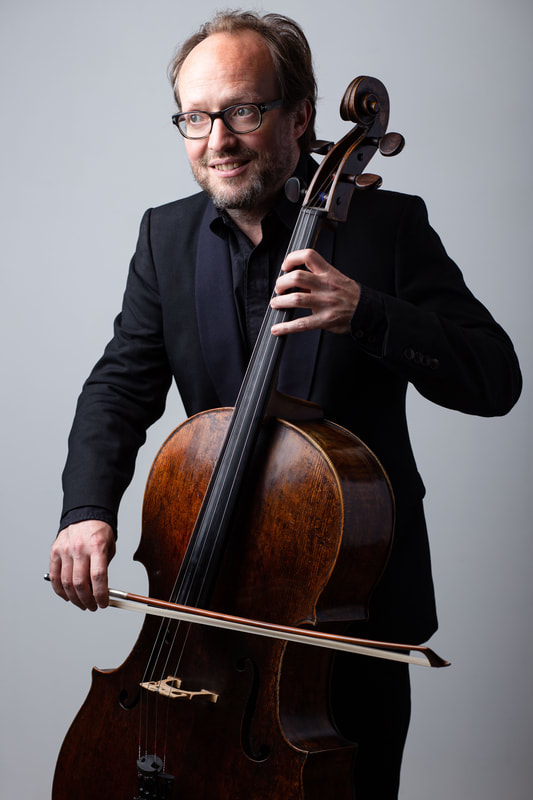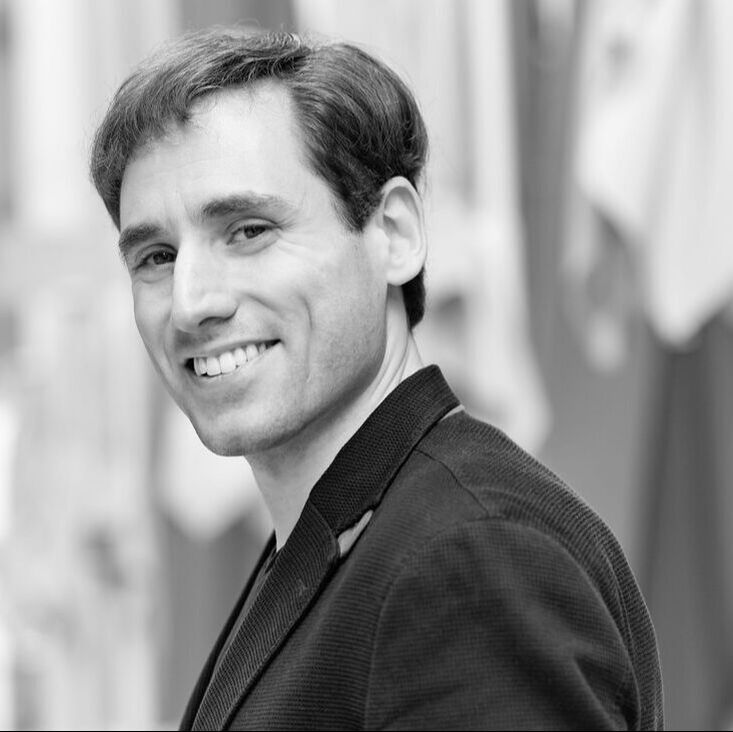|
Co-founder and co-director of the Charlottesville Chamber Music Festival and Charlottesville native Raphael Bell enjoys a varied career as a principal cellist, chamber musician, teacher, and festival director. He is currently principal cello of the Antwerp Symphony Orchestra in Belgium and co-Artistic Director of La Loingtaine in Montigny-sur-Loing, France. As a chamber musician he has performed at Wigmore Hall, Queen Elizabeth Hall, Salle Gaveau, Berlin Philharmonie, Köln Philharmonie, Luzerner Theater, Tokyo Suntory Hall, and Kyoto Concert Hall, and at festivals including Seattle Chamber Music, Ferrara Musica, Wiener Festwochen, Elba Festival, Ravinia, Verbier and Resonance Festival Belgium.
|
Bell was part of the IMS Prussia Cove tour that won the Chamber Music Award from the Royal Philharmonic Society in London, and has collaborated with musicians such as Steven Isserlis, James Ehnes, Martha Argerich, Pekka Kuusisto, Maxim Vengerov, Ivry Gitlis, and with quartets including Brooklyn Rider, Dante and Orpheus, as well as Oxalys and Japan's Nagaokakyo Ensemble. He gave the world premiere of Olli Mustonen's Triptych for three cellos with Steven Isserlis and Steven Doane. Solo performances include concertos with the Kristiansand Symphony Orchestra, Tokyo Luft Ensemble, and the Royal Flemish Philharmonic under Edo de Waart, and the Brahms Double Concerto with Philippe Herreweghe. This autumn he will perform Giovanni Sollima’s Violoncelles Vibrez! and the Saint-Saëns Cello Concerto with the Antwerp Symphony Orchestra, including a performance at the Amsterdam Cello Biennale. As a member of the Mahler Chamber Orchestra for many years, he played in the Lucerne Festival Orchestra’s celebrated Mahler Symphony Cycle with Claudio Abbado. He has also worked with the Munich Philharmonic, Chamber Orchestra of Europe, English Baroque Soloists, Orchestre Révolutionnaire et Romantique, and Scottish Chamber Orchestra, among others. Raphael studied at The Juilliard School with Harvey Shapiro, and later with Mario Brunello, Steven Isserlis and Ferenc Rados.
|
Born in 1984 in Moscow, Boris Giltburg moved to Tel Aviv at an early age, studying with his mother and then with Arie Vardi. In 2013 he won First Prize at the Queen Elisabeth Competition, catapulting his career to a new level. In 2015 he began a long-term recording plan with Naxos Records, and has since released solo discs of Beethoven, Schumann and Rachmaninov, Shostakovich concerti with Petrenko and The Royal Liverpool Philharmonic (Diapason d’Or), and Rachmaninov with Prieto and The Royal Scottish National Orchestra (Opus Klassik instrumental award).
|
Boris Giltburg has appeared with many leading conductors, and with orchestras such as Philharmonia Orchestra, Orchestre de Chambre de Lausanne, Rotterdam Philharmonic, Israel Philharmonic, Deutsche Kammerphilharmonie, London Philharmonic Orchestra, Oslo Philharmonic, WDR Cologne, St. Petersburg Philharmonic and Baltimore Symphony. He made his BBC Proms debut in 2010 and has toured frequently to South America and China.
He plays recitals in top venues such as Southbank Centre and Wigmore Hall, Amsterdam Concertgebouw, Elbphilharmonie Hamburg, Bozar and Flagey in Brussels, Radio France, Carnegie Hall, Tokyo Toppan Hall and Beijing Forbidden City Concert Hall.
Boris Giltburg has appeared with many leading conductors, and with orchestras such as Philharmonia Orchestra, Orchestre de Chambre de Lausanne, Rotterdam Philharmonic, Israel Philharmonic, Deutsche Kammerphilharmonie, London Philharmonic Orchestra, Oslo Philharmonic, WDR Cologne, St. Petersburg Philharmonic and Baltimore Symphony. He made his BBC Proms debut in 2010 and has toured frequently to South America and China.
He plays recitals in top venues such as Southbank Centre and Wigmore Hall, Amsterdam Concertgebouw, Elbphilharmonie Hamburg, Bozar and Flagey in Brussels, Radio France, Carnegie Hall, Tokyo Toppan Hall and Beijing Forbidden City Concert Hall.
A note from cellist Raphael Bell
If you are someone who loves the cello because of its singing sound, its closeness in range to the human voice, then there is no better place to turn than the Rachmaninov Cello Sonata. It is a favorite of cellists (and of very fine pianists), a grand sonata with tremendous lyricism, long spinning lines, explosions of virtuosity and bubbling intensity in the piano, but always returning to the poetry and inner feeling of those intimate singing lines. Rachmaninov wrote the cello sonata shortly after his second Piano Concerto and it is similar in its open, generous romanticism and grand scale. From the first notes, you are invited into a long story that unfolds over the following four movements. After hearing this outpouring of irrepressible melody, it’s difficult to imagine that Rachmaninov suffered writer’s block and composed almost nothing during the four years that preceded it. It is a piece I used to love listening to my old teacher Harvey Shapiro play, and in fact he and pianist Earl Wild performed it for Rachmaninov himself in a house concert in New York around 1940. The piano part is famously difficult, and for me as a cellist it is thrilling to sit so close, with the cello sound floating in and out of the piano’s waves of color, the two voices weaving together.
I imagine that you probably long for a return to live concerts and we really do too. This has been a lonely time for musicians and audience members alike with such limited contact with friends and family, but we also miss the experience in the concert hall, of being together, hearing the sound of a string sextet envelop us, the anticipation in a moment of silence, all the shared emotions, the communion on stage between musicians and audience. We miss that so much. However, I would also say that the opportunity to play and make these online streams, as limited as they may be, have really helped musicians get through this year. They have provided us purpose and payment, giving us opportunities to continue to live and share the music that we love and to which we have dedicated so much of our lives.
Over the past months, we have tried hard to keep busy (practicing, parenting, gardening, cooking) while watching the waves of cancellations, but after nearly a year and calendars wiped out of so many things looked forward to, there comes a time when you find yourself lacking even the desire to open up your instrument - and what for, with nothing on the horizon? In my case, I was lucky and it was the music of Mendelssohn that came to the rescue. My orchestra in Belgium continues to work in a reduced way, and last month we made a film of A Midsummer Night’s Dream (in Flemish). Mendelssohn's music is life affirming and beautiful, and hearing the choir and the soloists sing around us (at some distance) was deeply moving and wonderful. It immediately gave me strength and filled holes in the soul. Around this time Boris Giltburg and I began planning to record the Rachmaninov Sonata. And finally, hooray, after months, there was something new in front of me, a piece I wanted to play really well, something to help get me back on my musical horse.
When we recorded the sonata this past weekend it was more than amazing to feel the music stirring inside as we rehearsed and performed (for the cameras). I felt musically alive again, and for that I can only say thank you to the festival and supporters for giving us this opportunity to continue to make music. It’s not live in the concert hall with friends in the front row, but it keeps music alive for now and I really hope will also bring a meaningful moment to festival friends in Charlottesville and beyond when they listen.
If you are someone who loves the cello because of its singing sound, its closeness in range to the human voice, then there is no better place to turn than the Rachmaninov Cello Sonata. It is a favorite of cellists (and of very fine pianists), a grand sonata with tremendous lyricism, long spinning lines, explosions of virtuosity and bubbling intensity in the piano, but always returning to the poetry and inner feeling of those intimate singing lines. Rachmaninov wrote the cello sonata shortly after his second Piano Concerto and it is similar in its open, generous romanticism and grand scale. From the first notes, you are invited into a long story that unfolds over the following four movements. After hearing this outpouring of irrepressible melody, it’s difficult to imagine that Rachmaninov suffered writer’s block and composed almost nothing during the four years that preceded it. It is a piece I used to love listening to my old teacher Harvey Shapiro play, and in fact he and pianist Earl Wild performed it for Rachmaninov himself in a house concert in New York around 1940. The piano part is famously difficult, and for me as a cellist it is thrilling to sit so close, with the cello sound floating in and out of the piano’s waves of color, the two voices weaving together.
I imagine that you probably long for a return to live concerts and we really do too. This has been a lonely time for musicians and audience members alike with such limited contact with friends and family, but we also miss the experience in the concert hall, of being together, hearing the sound of a string sextet envelop us, the anticipation in a moment of silence, all the shared emotions, the communion on stage between musicians and audience. We miss that so much. However, I would also say that the opportunity to play and make these online streams, as limited as they may be, have really helped musicians get through this year. They have provided us purpose and payment, giving us opportunities to continue to live and share the music that we love and to which we have dedicated so much of our lives.
Over the past months, we have tried hard to keep busy (practicing, parenting, gardening, cooking) while watching the waves of cancellations, but after nearly a year and calendars wiped out of so many things looked forward to, there comes a time when you find yourself lacking even the desire to open up your instrument - and what for, with nothing on the horizon? In my case, I was lucky and it was the music of Mendelssohn that came to the rescue. My orchestra in Belgium continues to work in a reduced way, and last month we made a film of A Midsummer Night’s Dream (in Flemish). Mendelssohn's music is life affirming and beautiful, and hearing the choir and the soloists sing around us (at some distance) was deeply moving and wonderful. It immediately gave me strength and filled holes in the soul. Around this time Boris Giltburg and I began planning to record the Rachmaninov Sonata. And finally, hooray, after months, there was something new in front of me, a piece I wanted to play really well, something to help get me back on my musical horse.
When we recorded the sonata this past weekend it was more than amazing to feel the music stirring inside as we rehearsed and performed (for the cameras). I felt musically alive again, and for that I can only say thank you to the festival and supporters for giving us this opportunity to continue to make music. It’s not live in the concert hall with friends in the front row, but it keeps music alive for now and I really hope will also bring a meaningful moment to festival friends in Charlottesville and beyond when they listen.



